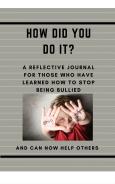by James Burns | Feb 10, 2015 | Anti Bullying Tips, Bully Proof Classroom, Coaching, Parents, Teachers, Uncategorized
Introduction
Since the dawn of public education teachers and schools have focused on the academic achievement of students. All students were expected to leave school with basic reading writing and math skills. Some kids excelled and went on to institutions of higher learning, some were trained at a trade such as carpentry, or auto mechanics, and still others left school with those basics and worked at more labor related jobs such as factory or office work. Everyone who left secondary school did have the basics just at different levels. Every student may not have had the capacity to go to college but just about everyone finished school and had the ability to function in the real world. With the onslaught of state mandated testing in so many school districts throughout the country teachers are still pressured to ensure that students achieve but the landscape has changed and hitting the bull’s eye is far more difficult than it was say forty years ago. The bull’s eye is tough to hit because teachers are now being asked to hit a moving target. The target keeps moving because the levels of disrespect, and irresponsibility pervades our schools and basically you can’t hit something that won’t sit still, keep quiet, come prepared, stay motivated, and who really has taken no ownership for their own education.
Local and state boards persist though in their belief that success is based upon achievement not on effort and character. The faulty philosophies that have come out of some of our colleges that focuses more on methods of instruction rather than behavior management has both young and veteran teachers alike trying to figure out how to hit that moving target. In schools right now we don’t need one more test, or in-service that helps teacher’s understand how to teach to the test we need a comprehensive program that focuses squarely on student behavior management, teaching respect, and encouraging responsibility. Our young teachers who have been in the field for between three to five years may not know any different and are hounded daily regarding the academic achievement of students whose behavior is out of control, and veteran teachers who have done a good job of reading the tea leaves are planning for retirement because the work load is increasing to the point that it is becoming unmanageable.
Our focus in education needs to be on steadying the target and improving student behavior, not on improving test scores. If we begin to focus on behavior, character, and effort rather than achievement test scores will naturally go up because we will begin to develop willing learners.
Colleges need to provide stronger training in the area of behavior management for future teachers and we need to provide more comprehensive training in the area of behavior management for teachers who are now in the field. Here are ten good reasons why:
1. Take a look at the schools
The behavior in our schools has deteriorated to the point that we don’t worry about school violence we worry more about school shootings. We are forced to get everyone to the finish line without mastery of basic content. So many kids come into schools with negative learned behaviors that we are forced to develop conditions to support the behavior. It would either be invent the condition or throw the kids out, but you can’t throw out the entire twenty to thirty percent of the chronic behavior problems. These kids aren’t going anywhere and they are going to make it tough for kids who want to learn to learn. So, if we want to teach the other seventy five to eighty percent we better figure out how to manage behavior problems.
2. This isn’t forty years ago
Let’s face it years ago parents supported the school and dealt with their child’s misbehavior. Today we have to fight the kid, the parent, and at times city hall. In addition the behaviors that we dealt with forty years ago were of the garden variety like having a playground fight, or goofing off in class. Today the levels of disrespect, and irresponsibility, are at such high levels that younger teachers have begun to view some of the behaviors as the “new norm” and anytime there is the slightest improvement they fall all over the kid with praise causing the kid to feel good about himself for no apparent reason.
3. Standardized testing is not a measure of achievement
Teachers are trained to teach to the test. Even for content related testing during the year there is this unspoken fear of failing a kid. Most kids have an inflated view of their academic ability and don’t realize their shortcomings until later in life when grades are more meaningful. Good grades are nice, but mastery is better. Students move through grade after grade with un-mastered skills and a lack of the necessary prerequisites to learn new information. This produces frustration, anxiety, and tension resulting in behavior problems.
4. Life is about Relationships
Ask any employer. They are more concerned about the attitude of their employee than whether or not they can do the job. They believe that they can always teach a person the skills on their job description, but they can’t teach the person how to get along. School is supposed to be a microcosm of society. Employers want their employee’s to be respectful, responsible, have a good attitude, can get along, show up, and are on time. Sound like school? If this is what employers want we should be teaching it; that is if we can find the time in the overly ambitious curriculum that is being used to help prime a kid to pass a test.
5. We don’t know how to have productive conflict
There are so many intergenerational dysfunctional problems in our families, schools, and in society in general that faculty rooms have become discussion forums. No answers, just discussions. The topic of the day here is the inability to confront each other, a student, parent, or an issue, or maybe our own demons. Productive conflict is something that is taught it is not an innate skill. Teachers may have difficulty with conflict strictly based upon their own life imprint. It is a skill that needs to be taught to our student’s so they can have disagreement and do it with the right attitude, and they can cooperate even though they may disagree. When this skill is not taught, power struggles are inevitable and relationships get strained. Some families don’t even talk to each other because of an unsettled youth conflict that became an adult conflict. Don’t worry once kids know this they’ll pass the test.
6. There are too many adults with poor attitudes
Kids are kids for a short period of time. Then they become adults; with the same crummy attitudes. Even the most intelligent of adults can have such arrogance that they are painful to be around. This is the other eighty percent of our school population. Knowledge without character produces this type know it all mentality. They were once kids who did well in school but never developed the character in order to know how to make the best use of their intelligence.
7. Our students lack empathy
As a society we just don’t have the same concern for each other as we once did. By this I am referring to the overall concern that a family has for the elderly couple up the street when there is a heavy snow fall, or helping someone with a dead battery, or bringing meals to a shut in. Adults don’t care as they once did and our kids care even less. There are too many students who stand around in school when someone is being bullied. Let’s make sure that they pass the test.
8. Bullying behavior is on the rise
Hurt people hurt people. Bullies come from dysfunctional families, are angry, and take out their anger on others. They made that decision around the age of five. Everyone knew there was something wrong but not enough was done to quell his/her misery. Early intervention didn’t happen and we ended up with a bully on our hands who interferes with the learning of others and creates an emotionally unsafe learning environment for everyone. Let’s take a test.
9. Kids seek revenge
It’s not enough to get even anymore and have a fair fight and get it over with. Revenge is the way today and kids don’t want a pound of flesh, they want a pound of your flesh and the flesh of five others. Victims who have been bullied don’t know how to fight back or have a productive conflict they digest the abuse and then act out when the time is right. Stop testing and start strengthening the victim. You will help them pass the test.
10. Some kids may be smart but they lack wisdom, and common sense
The smartest kids in the class could be the most deviant, and make the poorest choices. There are more kids today that can’t even make the smallest decision and can be led around by the nose by the wrong crowd. Smart doesn’t mean wise and at times even the smartest kids can lie, cheat, steal, and abuse others. Maybe even better than the average kid. There are all kinds smart and this kid is one dimensional, but he will pass the test.
Programs Needed
Motivating Disaffected and Hard To Handle Students
Designed For Teachers, Administrators, Guidance Counselors, Child Study Team Members, or Any Youth Care Provider
• Learn the symptoms of difficult students and treatment plans that work
• Build respect and rapport with your most difficult students
• Understand why students don’t care
• Develop language that confronts without condemning
• Break through the emotional wall of your students and increase motivation and responsibility
• Strengthen relationships with your students
There is a direct relationship between motivation and discipline. The hard to motivate are often hard to discipline. Teachers are becoming increasingly more frustrated and are asking what we do with students who are not prepared, don’t care, will not work, and are on track for failure as adults. Finding tools and strategies to increase motivation can solve many behavior problems. There are many things educators can do to reawaken motivation in students who have lost interest and perhaps hope. This seminar helps teachers develop techniques that build respect, increase responsibility, and develop greater compliance in students who are hard to handle. It helps teachers overcome the strong emotional frustration that saps their energy and ultimately leads to burnout.
Six Principles That Help Educators Help Students
1. Design – All students are designed in a unique way. This program helps teachers understand the problems that difficult students face and how we can improve their self-esteem and permanently change their behavior.
2. Authority – Help students understand the definition of maturity. Teach them respond to authority correctly to create more emotional freedom.
3. Responsibility – Learn the five key areas students are responsible for and stop their reactive and escalating behavior.
4. Ownership – Help students manage anger. Students will understand that they are not victims but people who can control their own responses.
5. Success – Help your students find answers to problems that occur and give them hope for the future. Get students to respond correctly in key relationships.
6. Problem Solving – Give your students the skills to self generate behaviors that build independence and maturity.
You Will Learn How To:
• Emphasize effort, create hope, build relationships, respect power, and express enthusiasm
• Teach respect, responsibility, and compliance
• Build relationships with even the most difficult students
• Establish guidelines for correcting inappropriate behavior
• Use the three-step process for correcting behaviors that works without fail
• Give a warning that communicates you say what you mean and mean what you say
• Build a student’s self esteem
• Help a student control his anger
• Teach relationship skills that work for a lifetime
• Keep students on task and focused
• Use visual cues that prevent confrontations and stop power struggles
The Bully Proof Classroom
Bullying has become an epidemic in our schools. However it is defined, bullying is not just child’s play, but a terrifying experience many American school children face every day. It can be as direct as teasing, hitting, or threatening, or indirect as exclusion, rumors, or manipulation. During the past decade, bullying has become more lethal and has occurred more frequently than it had in the previous two decades. Bullying can no longer be explained away, as some adults are inclined to do, as a normal part of growing up. Bullying has only harmful, not beneficial, effects for the target and the perpetrator- even the bystander. Many children in our nation filled with fear and intimidation because they are bullied and victimized daily. Bullying exacts a terrible toll on children, and the scars can last a lifetime” (nea.org). This workshop is designed to give teachers, parents, and students the necessary information to stop this epidemic from spreading any further.
This seminar will help your staff answer the following questions:
• What is bullying?
• What are the characteristics of bullies and victims?
• How prevalent is bullying?
• What actions and behaviors constitute bullying?
• What are the early warning signs of troubled children and those at risk for bullying behavior?
• How can we help the victims cope and deal with a bully?
This seminar will provide for staff, administration, students, and parents:
• Ideology: Bullying terminology and definitions
• Warning signs and characteristics of bullies and targets
• How to develop respect, responsibility and compliance in children
• Foundations of good character; teach students character qualities they will need for life-long success
• Strategies that help bullies and targets improve their coping skills
The New 3R’s in Education
Respect, Responsibility, and Relationships
The True Basics For All Success In life
Everybody knows what the 3 R’s of teaching are – reading, writing, and ‘rithmetic. But educators don’t totally understand that in order to teach these basic subjects successfully, they must constantly be working to develop respect and responsibility in their students. No longer can it be assumed that children develop these attitudes at home. Plus, teachers must learn how to build positive relationships with their students. Strong teacher-student relationships naturally foster a positive and safe learning environment where much learning will take place and where all students will become capable, connected, and contributing members of their classrooms.
Learn Practical Strategies That Will Teach The New 3r’s
1. Teach respect, responsibility, and compliance
2. Learn how to build strong positive relationships with students and parents
3. Understand how principles, rules, and procedures create a secure safe environment
4. Create a fair, and consistent learning environment that will be calming to even your most difficult students
5. Understand how to give instruction, warnings, and correction
6. Receive a set of effective consequences for grades K-12 that will impact future behavior
7. Practice proven verbal responses you can use in a crisis situation
8. Build respect and rapport with your most difficult students
9. Develop language that confronts without condemning
10. Break through the emotional wall of your students and increase motivation and responsibility
Defusing Power Struggles With Your Most
Difficult Students And Parents
Designed For Teachers, Administrators, Guidance Counselors, Child Study Team Members, Or Any Youth Care Provider
• Learn the symptoms of power struggles and how to deal with them
• Build respect and rapport with your most difficult students
• Develop language that confronts without condemning
• Break through the emotional wall of your students and increase motivation, compliance and responsibility
• Strengthen relationships with your students and parents
A Proactive Approach For Dealing With Power Struggles
Effective discipline can no longer be achieved solely through using authority. A typical school today has some students who have short fuses, and some who anger easily. Students today may make offensive statements and act in a hostile manner that can trigger a power struggle. Often, too much instructional time is lost because of minor disruptions that all too quickly escalate into classroom battles that destroy relationships and any positive climate that exists. To keep the focus on educational achievement educators must master how to avoid and diffuse power struggles. This practical workshop will present easy-to-learn methods of effective intervention that preserve students’ and teachers’ personal dignity.
Learn Practical Strategies That Prevent Power Struggles
1. Teach respect, responsibility, and compliance
2. Learn the warning signs for the onset of a power struggle
3. Learn how to build strong positive relationships with students and parents
4. Understand how principles, rules, and procedures create a secure safe environment
5. Create a fair, and consistent learning environment that will be calming to even your most difficult students
6. Learn proactive language that will diffuse potential power struggles, and allow you to gracefully exit from power struggles that do erupt.
7. Learn Techniques You Can Use When A Student Has Too Much Power In Your Classroom
8. Learn fogging techniques that distract and disarm the verbally aggressive student
9. Understand how to give instruction, warnings, and correction
10. Receive a set of effective consequences for grades K-12 that will impact future behavior
11. Practice proven verbal responses you can use in a crisis situation
Climate Control For
Your School and Classroom
This Conference Will Provide Teachers, Administrators, Anti Bullying Specialists and Coordinators with the Necessary Skills and Strategies to Help Teach Respect, Encourage Responsibility, Reduce Bullying Events, and Improve The Overall Behavioral Climate in Their Classroom and School.
This conference will help answer the following questions:
1. What are the characteristics of positive classroom/school climate?
2. Why is classroom/school climate so important?
3. How do I encourage respect?
4. What do I do with disrespectful behavior now?
5. How do I increase student accountability and build greater student responsibility?
6. How does an improved school and classroom climate increase student achievement?
7. Why is it so important for kids to feel emotionally safe?
8. What do I do with disrespectful and unsupportive parents?
9. How can we help the victims cope and deal with a bully?
This conference will provide for staff, administration, and
child care professionals:
1. 12 Strategies to help improve classroom/school climate
2. How to develop respect, responsibility and compliance in all students
3. How teach students character qualities they will need for life-long success
4. Strategies that help bullies and targets improve their coping skills
5. How to develop a code of conduct that can be effectively communicated to all students
6. How to be more effective in changing student behavior
7. The importance of getting and keeping everyone working on the same school goals
Become Your Personal Best
A in-service for teachers, administrators, CST members, guidance personnel, support staff or anyone who wants to learn powerful principles in personal change
What This In-Service Will Do For Educators:
1. Learn the principles of personal growth and change
2. Begin to understand who you really are and what your purpose is
3. Build powerful relationships with co-workers and superiors
4. Develop effective communication skills to use with parents, students, superiors, co-workers
5. Learn how to become part of the solution rather than complaining about problems
6. Build rapport with the most difficult co-workers and parents
7. Learn how to be proactive rather than reactive
8. Learn how to build security and confidence through your own success
9. Learn wise time management
10. Build team building skills
11. Learn how to identify problems in your own value system and how to improve it
12. Restore the character ethic to your own life
13. Develop a balance in your physical, mental, and social and emotional life
A Proactive Approach For Dealing With Life
In education, we constantly have sought to improve the behavior and the academic achievement of our students. Almost every continuing education workshop or class is designed to help educators accomplish this. Even though this is valuable, these workshops fail to address the idea that it is the character of the teacher that will affect students’ success in the classroom and ultimately in life. Educators can fall into the trap of becoming so focused on the deficits of others, i.e. the students, the parents, supervisors, child study members, and co-workers that they become less concerned about their own areas of weakness. This workshop is designed to teach your educators how to become more self-aware and give them strategies to personally strengthen their value system and their character. The effect of your educators moving closer to becoming self-actualized will be that they will become more effective in their respective roles, and they will be much better equipped to meet the needs of all of their students.
You Will Learn How To:
Realize Your Ultimate Personal Potential And
Become The Best Educator You Can Be
Character Is Everything
Changing Student Behavior from the Inside Out
Designed For Teachers, Administrators, Guidance Counselors, Child Study Team Members, Or Any Youth Care Provider
1. Create an awareness in students, teachers, and administrators of the importance of character and its relationship to achievement
2. Build relationships with your most difficult students
3. Understand the root problems behind lack of student achievement
4. Develop language that confronts without condemning
5. Understand the Emotional Bank Account and make deposits of praise and acceptance
Proactive Approach For Dealing With Behavior Problems
Much has been said over the years about the student who is difficult to manage, and who exhibits behaviors that lack a moral compass. Educators and child-care providers need strategies that address the pervasive problems of disrespect, irresponsibility and a lack of compassion for their fellow students. In this seminar Jim Burns addresses the problems that are at the root of these behaviors. Character training truly makes a difference in the outcome of a student’s life. As a student builds character he/she will become more successful. Students who are taught character qualities such as honesty, reliability, diligence, and respect learn to change their behaviors from the inside out and truly understand how to self generate positive behaviors, and have a change of heart, not just a change of mind.
Qualities Developed Through Improved Character
1. Self-Acceptance – As students are recognized for showing specific character qualities, they will improve in other areas as well, such as achievement, respect, and responsibility.
2. Responses to Authority – As the key people in the school recognize these positive qualities in each student, students will have a more positive response to them. Teachers, administrators, and support staff will then be able to discipline students in a much more positive manner and teach the necessary skills for lifelong success.
3. Relationships – Because there is so much positive reinforcement for students in the praising of character, students will begin to see each other in a more positive light. Students will then encourage positive character in each other.
4. Priorities – Because students will begin to feel better about their own character, they will be able to focus on achievement. This will help to reduce anxiety and eliminate bad habits.
You Will Learn How To:
• Teach character through instruction, example, and activities
• Recognize positive character in students and praise them for their efforts
• Change the way you look at student behavior
• Model positive character for your students
• Give a warning that communicates that you are concerned about the student’s reputation
• Build a student’s self esteem
• Help a student control his/her anger
• Teach relationship skills that work for a lifetime
• Use character to improve student attendance, grades, and test scores
• Use behavioral referrals as an instructional tool to teach character
About Jim Burns
Since 1977 Jim Burns has been working with students who have learning disabilities and behavioral problems. He has almost 40 years of experience working as an administrator, teacher, college instructor, and seminar leaders. He is committed to helping administrators, parents, and teachers establish standards of excellence and help them build successful relationships with their staff, students, and children. He has written and designed The Bully Proof Classroom, a graduate course that is now offered at The College of New Jersey in partnership with The Regional Training Center. This course is endorsed by the NJEA. He has also written “Anti Bullying 101.” A book that provides teachers, administrators, support staff and parent’s 101 tips on how to achieve permanent help in dealing with unruly behavior and can be used as part of any anti-bullying program. He is available for on sight in-services and keynotes and can be reached at 1-732-773-9855 or at jameshburns55@gmail.com
Books Available
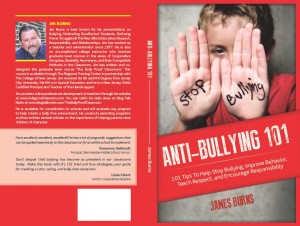
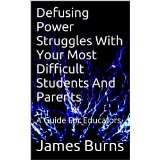

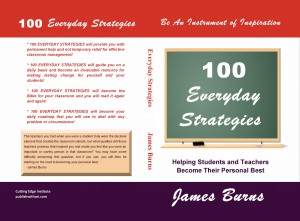
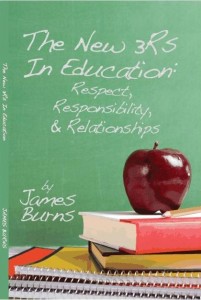

by James Burns | Jun 16, 2014 | Bullies, Coaching, Teachers, The Bully Proof Classroom
With the new teacher evaluation system now firmly entrenched in New Jersey Schools and in other schools around the country teachers need help now more than ever in meeting their professional responsibility to follow the recommendations established by school administration. Ensuring that students’ progress academically it is extremely important and it is the primary reason why children attend school. Teachers are trained in their subject area and are always ready to deliver expert instruction to help ensure that their students will achieve a life time of success and of course do well on state mandated tests that provide the evidence of student achievement. Colleges have provided the necessary course work for core content, but have not provided enough rigor in helping teachers deal with the behavioral dysfunction that is faced in schools each and every day. Student behavioral problems interfere with the learning process with power struggles, disrespect, irresponsibility, non-compliance, bullying, and violence eating into the teacher’s time, and creating a non-productive learning environment. The old adage that teachers spend 90% of their time dealing with 10% of their students could never be truer. Behavior problems disrupt the consistency of instruction, creates emotional fear in the minds of other students, increases the absentee rate, can intimidate the teacher, and prevents students from retaining information in their long term memory. It effects the entire classroom and school climate.
The Bully Proof Classroom does not view bullying as the sole problem, but more the result of the problem. The problem is the lack that students have for the rights and privileges of other people, which we define as disrespect. Bullying is the behavior that epitomizes this disrespect. This disrespect permeates classrooms, schools, families, and communities and can make teaching one of the most challenging professions in which an individual enters into.
We at The Bully Proof Classroom are offering to schools and individual teachers a program called Edu-Coaching. This program provides a behavioral coaching program for teachers that will help them regain some of the surrendered ground that the students have claimed and give them the tools necessary to teach respect, encourage responsibility, and improve school and classroom climate. This is not consulting work, but rather an approach that uses on sight coaching as well as coaching with the use of emails and text messages. Schools or individuals who use this program will receive the following:
1. A two hour in-service on the topic of anti-bullying. This in-service covers the strategies necessary to teach respect and improve school and classroom climate.
2. On sight observation of individual teachers to help improve student behavior. This is not an evaluation it is designed to offer constructive suggestion and encourage positive student teacher relationships.
3. Weekly teaching emails that provide strategies to meet the needs of individual teachers.
4. Text messages that offer suggestions for more immediate problems.
5. Phone consults on an as needed basis.
6. Face to face consults on an individual basis.
7. Face to face conversations with administration to help them help their teachers.
8. Schools will receive an evaluation of the school climate with a report provided to the entire staff in a power point presentation.
If anyone is interested please email me at proactive7@verizon.net or give me a call at 732-773-9855.
This would be a contracted service and would be available for 6 months or one school year. Face to face services would be available for teachers and schools in NJ, NY, MD, PA, and CT. Phone consults, emails, and text messaging are available nationwide.
by James Burns | Jan 11, 2014 | Bullies, Bully Proof Classroom, Parents, Teachers
Forgive and forget; that’s the line we are all taught as kids, and as adults we try to be sure not to hold grudges against those who have slighted us or who have exhibited behavior that lessened our own sense of self worth. Well, the forgiving part is easy because we forgive for ourselves and saying I forgive you is easy enough but, unless a person gets amnesia they will never forget the past hurts that have been inflicted upon them by their parents, peers, siblings, or maybe even employers. We all are only a compilation of what people have said to us or done to us, and those past hurts can wreak havoc on future relationships and can produce in families what I call
The Haunted House.
This house is not the brick and mortar variety and the residents are not harassed by the likes of some specter in the movie Poltergeist. It is a place where the experiences of the past have created an environment where the members of this family accept the abnormal behavior almost as a new normal, and this is where many children are raised. The dysfunction that occurs within the walls of this house is a direct result of the past hurts of the parents of the children that have been inflicted upon them by their parents or other significant others. Remember, people never forget, and if anger and bitterness remain because of past hurts during a person’s upbringing the children will suffer at the hands of a parent who lacks the ability to love, discipline, and communicate and by all measures is a parental bully; a bully who lacks the requisite skills to form a lifelong relationship with his/her children. But, that’s not all; this parental bully will create schisms in the house that pit the family members against each other and an example will be set that I get what I want through fear and intimidation.
What are some of the problems that this haunted house produces? Well read on and you will discover some of the reasons why dysfunction exists in so many homes, schools, and society.
The Haunted House produces a poor perception of life. Things don’t happen to us they just happen. Our reaction or our response to what happens will determine the tone that gets produced in a home. Those that live in a haunted house are always blaming circumstance or upbringing as the reason why they act as they do. They believe that they are determined. In other words, it came down through the DNA molecules or the learned behavior is so ingrained that they just can’t change. They don’t believe in the power of change or that they can change their response to the negative influences that have plagued them over the years. They are irresponsible in their thoughts, words, actions, attitudes, and motives and these negative traits just leak out into the atmosphere of the home where they are absorbed almost by osmosis by the children.
The Haunted House produces disrespectful attitudes. Ah, yes respect; having a high regard for the rights and privileges of another person. Respect is hard to give if you are not receiving it yourself and in a haunted house respect is tough to find. Parents who have multiple children and who are disrespectful can almost unwittingly create such sibling rivalry that the children begin to bully one another. Mom and dad fight all the time so it must be okay for us to fight as well. The problems really start though when mom or dad starts to draw some unfavorable comparisons between the children. This by default produces a sense of favoritism with children becoming jealous and envious of each other with one of the children gaining an upper hand; the upper hand that was given to them by one of the parents. Once the attitude of superiority develops in one of the children they then begin to believe that they can say and do what they want to their sibling(s). This behavior can be so unforgiving that it can produce scars that last a lifetime and it all started in the dysfunctional haunted house.
The Haunted House produces a lack of cooperation and non-compliance. Why are kids rude and disrespectful to one another? Is it a condition or is it learned behavior? I am not going to get into whether or not ADHD or ODD is the cause of the problem. All I can say is that 40 years ago the problems with blatant disrespect were few and far between possibly because these conditions weren’t invented yet. Bullying is a learned behavior and it is learned intergenerationally. What parents do in moderation the children will do in excess. Adult children who have left home in rebellion and have strained relationship with their parents have lost their ability to cooperate with family, school, and employment systems. They no longer know how to cooperate even though they might not agree nor do they have the ability to disagree with the right attitude. Moreover, the kids suffer because this attitude is brought into schools across the country where the children of these parents bring that same learned behavior with them and will con mom/dad to fight to the end against a discipline policy that that they believe has treated them unfairly. Parents accept this challenge only because they believe that they can win the battle with the school but will ultimately loss the battle with their child at home. This lack of cooperation and non-compliance has imputed the idea in our children that they are more academically adept than they really are, and that behavior is relative to a situation. It communicates that everyone has reasons for their behavior, but rapidly these reasons are becoming excuses. Self esteem is important but because of the failure to see the forest for the trees today kids feel good about themselves for no apparent reason. This failure of a society to go to the mat with this type of behavior has produced entitlement in our children and has allowed the bullying epidemic to escalate across the country.
So What Can We Do? We can’t change the way a parent was raised, but we can work to change the attitudes of children today, so going forward the next generation will develop more kind and caring behavior towards each other. Permanent help comes when we address the root problem and it is eradicated almost like the vaccine eradicated polio. Temporary relief comes when we work along the way and treat the symptoms we see and hold individuals more accountable for their actions. Awareness is the key and parents must be aware of their own upbringing and how the past can truly remind them of what they are not now. So here are some ideas on how we can overcome the dysfunction of the haunted house.
Knowledge of where we came from can at first be frightening but then it can help us gain insight into our own behavior. I am not talking about genetics here but more how we can understand the lifestyle and behavior of our ancestors. Do a family tree or visit the homeland of your grandparents if possible. It can help to understand the origin of some of the dysfunction that plagues you today.
Build a value system in your home. Know what is important to you and understand why you are teaching it to your kids.
Set boundaries long before they are violated. Boundaries set in anger only make situations worse. Teach your children how to set boundaries as well especially if they are the victim of bullying. Teaching a child at a young age to say “Stop, Knock It Off” can go along way in building their confidence.
Know your own discipline style. Are you autocratic or permissive? Do you best to balance your rules with a sense of love and understanding.
Don’t hold grudges especially against your spouse or your children. Once consequences have been imposed by you or even someone else realize that the deed was done and the price was paid.
Ask for forgiveness when needed and keep the emotional bank account from becoming overdrawn. This helps build trust and allows for mistakes.
Talk to your parents. Get things straightened out if the relationship with your parents has been strained over the years. Understand that you don’t have to do what your parents say, but always work to respect their opinion.
Understand that change at times can be frightening and that it is a step of faith. Accept the incremental process of change and be aware that you will revisit old behaviors from time to time.
Accept confrontations as a part of life and be courageous. Fearing someone can be paralyzing especially if it is your own child that you fear. Realize for yourself and for your children that courage is like a muscle and we only have to be brave for 2 minutes at a time.
Realize that this process is a marathon not a sprint. Stay the course, don’t give up. If necessary seek the help of a mental health professional to gain greater understanding into your own behavior.

